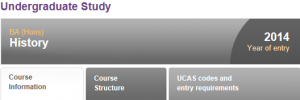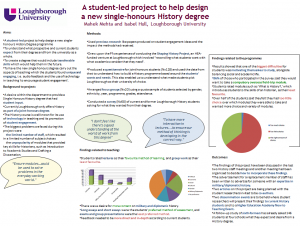Student Engagement in Curriculum Design

 Marcus Collins from the Department of Politics History and International Relations won one of seven Teaching Innovation Awards this year. The project title was ‘Student Engagement in Curriculum Design’ and involved a group of 7 students (plus himself) carrying out research and work on the creation of a new single-honours History course set to run from September 2014 here at Loughborough.
Marcus Collins from the Department of Politics History and International Relations won one of seven Teaching Innovation Awards this year. The project title was ‘Student Engagement in Curriculum Design’ and involved a group of 7 students (plus himself) carrying out research and work on the creation of a new single-honours History course set to run from September 2014 here at Loughborough.
To begin with they met a number of people to help formulate and strengthen their ideas. Including a meeting with the Vice Chancellor Professor Robert Allison to talk about some of the strengths already evident in the History Joint-honours course such as the innovative learning technologies. The team also hosted a talk given by Grace Barker from the University of Newcastle, known for her work on Student Engagement. In addition to this, once the project was in full swing, the students took their work to present at this year’s RAISE conference held at Nottingham Trent University.
The project’s research was focused on asking the current History joint-honours students for their feedback to find out what currently works best, and what perhaps could be changed. Research methods included surveys, questionnaires and focus groups. Other than paper copies of surveys being handed out in class some of the questions were put onto lecture slides and asked for a vote via the Turning Point clickers which added variety and captured large numbers of respondents.
 Results from the project showed that the current History joint-honours students enjoy the use of innovative technology; examples listed were the recorded lectures via ReVIEW, the Turning Point Clickers and also the use of Twitter for asking questions and making points during the lectures.
Results from the project showed that the current History joint-honours students enjoy the use of innovative technology; examples listed were the recorded lectures via ReVIEW, the Turning Point Clickers and also the use of Twitter for asking questions and making points during the lectures.
When asked about the History lecturers and what they liked about the methods and styles of teaching, students used words such as ‘enthusiastic’, ‘approachable’ and that the students ‘are more of a name than a number’.
Findings also showed that students prefer flexible assessment methods, for example, being able to choose essay questions, sources and a dissertation topic. They said that they found a greater enjoyment of the module through choice.
The project has developed 12 draft recommendations for the new single-honours History course. These recommendations were opened up for discussion at the History Forum on the 14th October where students and staff were invited to hear about the findings and to add their thoughts on the recommendations.
Extracts from the draft recommendations include:
- more of an emphasis on transferable skills
- a greater choice of modules
- a greater emphasis on presentations and group work
- a high-visibility Learn page that outlines assessment criteria
- greater utilisation or audio feedback
- adjustments on the amount of weekly reading set
- a compulsory Careers and Employability module.
These recommendations are yet to be set in stone but the amount of research and valuable data included in this project really has come from the student voice. The team have done a great job in capturing this and have been immersed in the design of this single-honours course which in practise will produce a student centred and excellent degree programme.